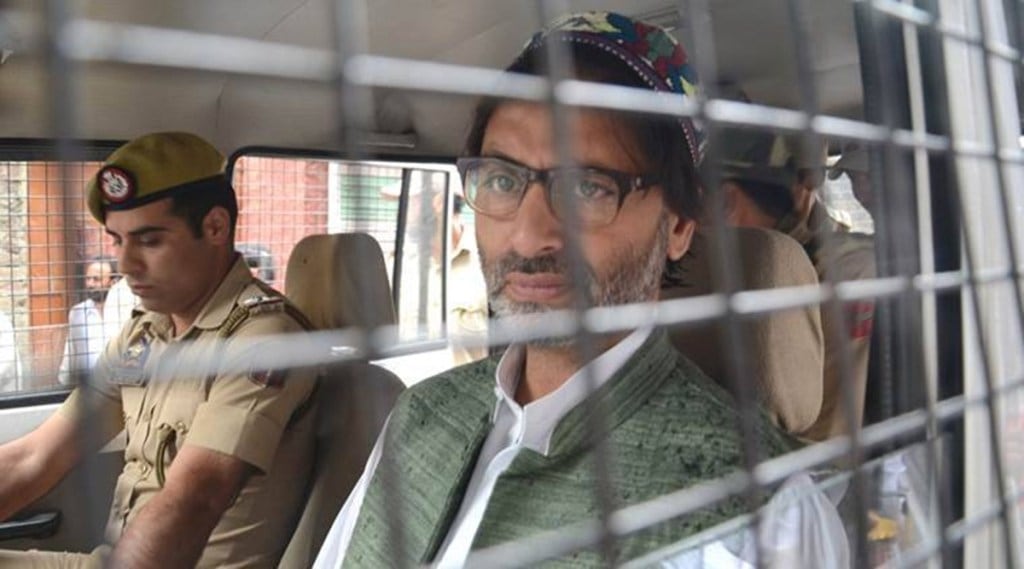A special National Investigation Agency (NIA) court on Wednesday sentenced Kashmiri separatist leader Yasin Malik to life imprisonment under Section 121 of the Indian Penal Code (waging war against State) in connection with a terror funding case. Earlier, Malik had pleaded guilty to all the charges framed against him including the anti-terror law Unlawful Activities Prevention Act (UAPA). After the life imprisonment sentence by the Delhi court, take a look at Yasin Malik’s journey and all the cases that have been slapped on him so far.
Malik was first arrested and detained for four months back in the early eighties. Leading to his arrest, his newly formed rebel group called the Tala Party tried to disrupt an ongoing cricket match between India and West indies in the Sher-i-Kashmir, and disrupted several gatherings of the National Conference while raising their voices against the execution of a Kashmiri separatist leader Maqbool Bhat.
After his release in 1986, Malik became the general secretary of the Tala Party, which was subsequently renamed as the Islamic Students League (ISL). The ISL joined the Muslim United Front (MUF) ahead of 1987 Assembly Elections, which was infamous for rigging of polls as many consider it as a turning point in the Valley and the subsequent rise of militant nationalism. Malik’s party didn’t contest any seats as he didn’t believe in a constitution.
Malik was arrested while campaigning for MUF candidate Mohammad Yusuf Shah before he was nabbed by the police without any formal complaint and was kept in prison until the end of the year. Many scholars pointed out, later on, that Yusuf would have won by a landslide. Shockingly, the National Conference candidate was declared winner.
Malik crossed over to Pakistan upon his release. After receiving training in Pakistan-controlled Kashmir, he returned in 1989 as an important member of the Jammu and Kashmir Liberation Front (JKLF) while declaring that he would fight for the complete independence of the erstwhile princely state. After raising a guerrilla war against Indian armed forces by targeting several government officials, the JKLF also kidnapped the daughter of then Indian Home Minister Mufti Mohammad Sayeed, Rubaiya Sayeed in 1989.
In the following year, Malik was eventually captured and imprisoned. He was granted bail in 1994. After his release on bail, Malik, on behalf of JKLF, announced an indefinite ceasefire. Malik gave up armed insurgency and expressed his intent to take a more democratic route when it came to solving Kashmir’s problems. Even after renouncing his old ways, problems never seemed to go away for Malik. He wanted the involvement of both Pakistani and Indian governments to find a political solution for the afflicted region. His terms were not acceptable to the Indian government. Malik threatened to set himself on fire in 1995 in protest against the Kashmir state elections. He claimed that the Indian government has forced elections upon the Kashmiris in the garb of democracy.
Malik’s “non-violent” approach didn’t go down well with the extended JKLF leadership in the Pakistan-occupied Kashmir either. They slowly isolated Malik. Malik was held in 1999 under Public Safety Act and then arrested again on 2002 under the Prevention of Terrorism Act where he was kept in jail for a year. In 2007, Malik had launched a year-long Safar-i-Azadi movement aimed at raising anti-India sentiments in the minds of other Kashmiris.
In 2013, Malik shared the stage with Lashkar-e-Taiba chief Hafiz Muhammad Saeed, who was also allegedly behind the Mumbai terror attacks of 2008, at Islamabad. On March 2020, Yasin Malik was slapped with Terrorist and Disruptive Activities (Prevention) Act (TADA), the Arms Act 1959 and Ranbir Penal Code over an attack on Indian Air Force personnel back in 1990 wherein one IAF officer died. He was also on trial for the kidnapping of Rubaiyya Saeed and the subsequent release of five terrorists.
In 2017, the NIA slapped a case of terror funding against many separatist leaders including Malik. The NIA, in its charge sheet, highlighted how the group had utilised funds from Pakistan to cause unrest in the Valley in 2010 and 2016, and had also organised several incidents of stone-pelting during protests.
Malik was also convicted under sections 38 and 39 of UAPA (association with a terrorist organistion and inviting support for the terrorist organisation). On May 10, 2022, Malik pleaded guilty to all charges levelled against him.

